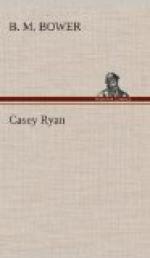He struck Furnace Lake just before dusk one night and pushed the burros out upon it, thinking he would have cool crossing and would start in the morning with the lake behind him, which would be something of a load off his mind. In his heart Casey hated Furnace Lake, and he had good reason. It was a place of ill fortune for him, especially after the sun had left it. He wanted it behind him where he need think no more about it and the grewsome crevice that cut a deep, wide gash two thirds of the way across it through the middle. Casey is not a coward, and he takes most things as a matter of course, but he admits that he has always hated and distrusted Furnace Lake beyond all the dry lakes in Nevada,—and there are many.
He yelled to William, and William nipped the nearest burro into a shambling half trot, and then went out upon the lake, Casey heading across at the widest part so that he would strike his old trail to Starvation Mountain on the other side. From there to the summit he could make it by noon on the morrow, he planned. Which would be the end of his preliminary journey and the beginning of Casey’s last drive toward his goal; for from the top of the divide between Starvation Mountain country and that forbidding waste which lies under the calm scrutiny of Furnace Peak he could see the far-off range of the Tippipahs.
He was a mile out on the Lake when he first glimpsed the light. Casey studied it while he walked ahead, leaving no footprints on the hard-baked clay. He had not known that any road followed just under the crest of the ridge that hid Crazy Woman lake, yet the light was plainly that of an automobile moving with speed across the face of the ridge just under the summit.
Away out in the empty land like that you notice little things and think about them and try to understand just what they mean, unless they are perfectly familiar to you. One print of a foot on the trail may betray the lurking presence of a madman, a murderer, a traveling, friendly, desert dweller or the wandering of some one who is lost and dying of thirst and hunger. You like to know which, and you are not satisfied until you do know.
A light moving swiftly along Crazy Woman ridge meant a car, and a car up there meant a road. If there were a road it would probably lead Casey by a shorter route to the Tippipahs. While he looked there came to his ears a roaring, as of some high-powered car traveling under full pressure of gas. The burros followed him, but William lifted his head and brayed tremulously three times in the dark. Casey had never heard him bray before, and the sudden rasping outcry startled him.
He went back and stood for a minute looking at William, who turned tail and started back toward the shore they had left behind them. Casey ran to head him off, yelling threats, and William, in spite of his six water cans—two of them empty—broke into a lope. Casey glanced over his shoulder as he ran and saw dimly that the burros had turned and were coming after him, their ears flapping loosely on their bobbing heads as they trotted. Beyond him, the light still traveled towards the Tippipahs.




